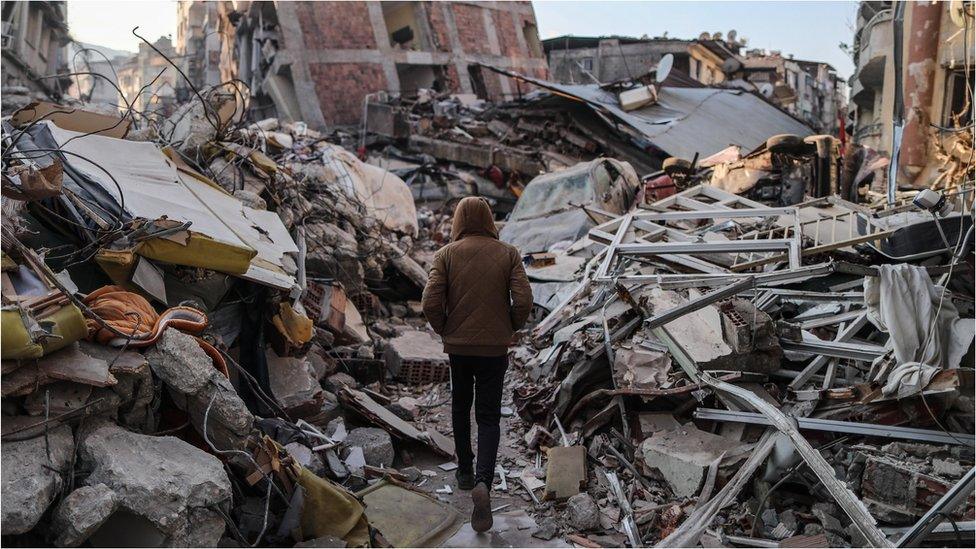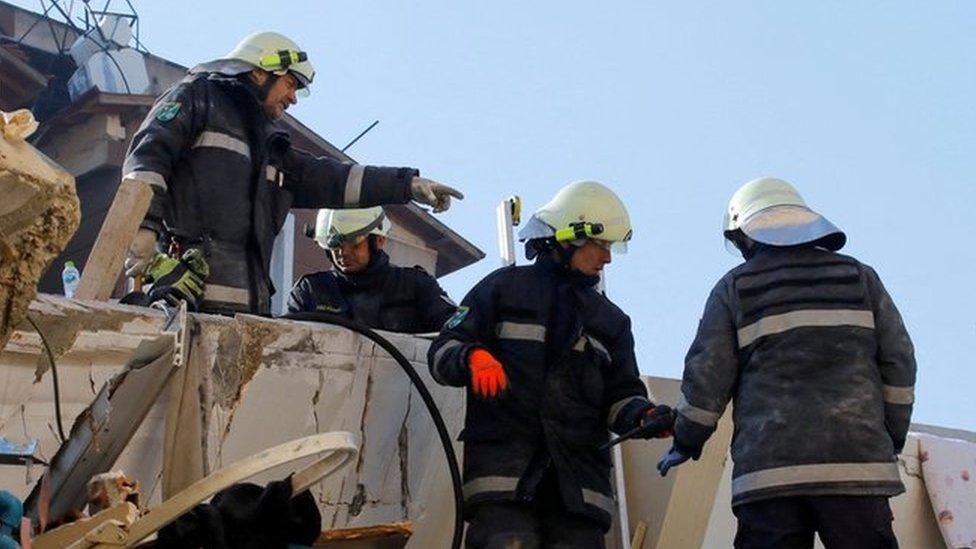Turkey earthquake: 113 arrest warrants connected to building construction
- Published

Aid agencies have warned that the death toll is likely to rise as rescue efforts continue
Officials in Turkey say 113 arrest warrants have been issued in connection with the construction of buildings that collapsed in Monday's earthquake.
Turkish police have already taken at least 12 people into custody, including building contractors.
Meanwhile, unrest in southern Turkey has disrupted rescue efforts in some places.
The number of people confirmed to have died in Turkey and Syria has risen to more than 33,000.
More arrests are expected - but the action will be seen by many as an attempt to divert overall blame for the disaster.
For years, experts warned that many new buildings in Turkey were unsafe due to endemic corruption and government policies.
Those policies allowed so-called amnesties for contractors who swerved building regulations, in order to encourage a construction boom - including in earthquake-prone regions.
Thousands of buildings collapsed during the earthquake, raising questions about whether the natural disaster's impact was made worse by human failings.
With elections looming, the president's future is on the line after spending 20 years in power.
Mr Erdogan has admitted shortcomings in the response, but, during one visit to a disaster zone, he appeared to blame fate. "Such things have always happened," he said. "It's part of destiny's plan."
On the sixth day after the quake hit, the situation is growing more desperate.
On Saturday, German rescuers and the Austrian army paused search operations because of clashes between unnamed groups in Hatay province. Security is expected to worsen as food supplies dwindle, one rescuer said.
"There is increasing aggression between factions in Turkey," Austrian Lieutenant Colonel Pierre Kugelweis said. "The chances of saving a life bears no reasonable relation to the safety risk."
The search for survivors resumed under the protection of the Turkish army.
Across southern Turkey and northern Syria, millions are homeless and temperatures continue to drop below freezing on a nightly basis.
The UN has warned that more than 800,000 people are without adequate meals, and its aid agency on the ground is warning the final death toll from the quake is likely to double.
In Syria, the death toll now stands at more than 3,500 - but new figures have not been published since Friday. On Sunday, the number dead in Turkey rose to more than 29,000.
Hope of finding many more survivors is fading, despite some incredible rescues.
Among those rescued from the rubble on Saturday were a family of five in Turkey's Gaziantep province, and a seven-year-old girl in Hatay, who spent 132 hours under the rubble.
The quake was described as the "worst event in 100 years in this region" by the United Nations aid chief, who was in the Turkish province of Kahramanmaras on Saturday.
"I think it's the worst natural disaster that I've ever seen and it's also the most extraordinary international response," Martin Griffiths told the BBC's Lyse Doucet in Turkey.
Mr Griffiths has called for regional politics to be put aside in the face of the disaster - and there are some signs that this is happening.
The border crossing between Turkey and Armenia reopened on Saturday for the first time in 35 years to allow aid through.

Stories of survival
Watch: Rescuers use specialist cameras to free Irem And Merve from the rubble of their building in Antakya
Related topics
- Published11 February 2023
